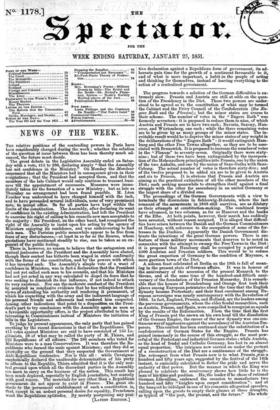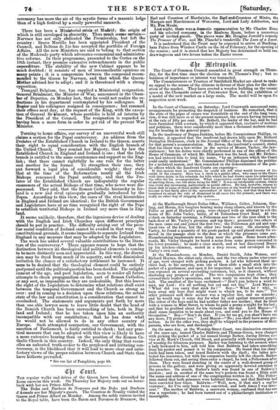The progress towards a solution of the German difficulties is
ex- tremely slow. Prussia and Austria are still at odds on the ques- tion of the Presidency in the Diet. These two powers are under-
stood to be agreed as to the constitution of what may be termed
the Cabinet and the Privy Council of the Confederation (the En- gere _Rath and the Plenum); but the minor states are averse to
their scheme. The number of votes in the " Engere Rath" was formerly seventeen : it is proposed to reduce them to nine, of which Austria and Prussia are to have two each; Bavaria, Saxony, Han- over, and Wartemberg, one each ; while the three remaining votes
are to be given by as many groups of the minor states. The in- evitable result would be to deprive the minor states of any weight in the deliberations of the " Engere Rath " : it would extinguish Thom- burg and the other Free Towns altogether, as they are to be asso- ciated with Brunswick. It is proposed to increase the number of votes
in the "Plenum" to seventy-seven. Originally there were sixty- nine ; but of these two have been extinguished by the incorpora- tion of the Hohenzollern principalities into Prussia, one by the union of the two Anhalts, and one by the union of Saxe-e-otha with Saxe- Coburg. The actual number of votes is therefore sixty-five ; and of the twelve proposed to be added six are to be given to Austria and six to Prussia. It is obvious that Prussia and Austria are aiming at the practical extinction of all the other members of the Diet ; each seeking meanwhile to strengthen itself against a final struggle with the other for ascendancy in an united Germany or the largest share of a divided one. The proceedings of the German Governments with a view to terminate the dissensions in Schleswig-Holstein, where the last remnant of the movements in 1848 still survives, are as dilatory as their attempts at constitution-making. The combined troops have advanced, in two columns, as far as Hanover and the banks
of the Elbe. At both points, -however, their march has suddenly
been arrested, without reason assigned. It is alleged that difficul- ties have arisen between the Danish and the German Commissioners at Hamburg, with reference to the occupation of some of the for- tresses in the Duchies. Apparently the Danish Government dis- trusts the intentions of the great German powers, There is one. feature of these military movements that deserves to be noted in connexion with the attempt to swamp the Free Towns in the Diet:
it is proposed that Hamburg shall be occupied by a garrison of 4500 Austrian and Prussian soldiers. This would be to reduce the great emporium of Germany to the condition of Mayenoe, a
mere garrison town of the Diet. * A solemn feast celebrated at Berlin on the 18th is full of mean- ing in the present state of German affairs. It was in honour of the anniversary of the accession of the present Monarch to the throne, and at the same time of the hundred-and-fiftieth anni- versary of the foundation of the Prussian Monarchy. It is remark- able that the houses of Brandenburg and Orange first took their places among European potentates about the time that the English dynasty became Protestant; suid their final enrolment among Eu- ropean sovereigns was nearly contemporary with the Revolution of 1688. In fact, England, Prussia, and Holland, are the leaders among the parvenue governments, whom the elder feudal monarchies, such as Austria, France, and Spain, were compelled to recognize as equals by the results of the Reformation. From the time that the first King of Prussia put the crown on his own head till the dissolution of the German Empire, the career of the new dynasty was one con- tinuous war of aggression against the ascendancy of the AustrianEm- peters. This Contest has been continued since the substitution of a
confederation of German States for the Empire. Prussia has gained immensely in the course of this struggle, as the most pow- erful of the Protestant and industrial German states ; while Austria, as the head of feudal and Catholic Germany, has lost in an almost equal proportion. The intrigues now carried on under the pretext of a reconstruction of. the Diet are a continuance of the struggle. The retrospect from what Prussia now is to what Prusinaiwas. a . hundred and fifty years ago, suggested by the festival of the 18th instant, is eminently calculated to flatter the pride and nerve the audacity of that power. But the manner in which the King was pleased to celebrate the anniversary shows how little he is the man of his time and position. He; the leader if he chose of rational - German Liberalism, embraced. the occasion to manufacture two hundred and fifty "knights upon carpet consideration " : and at the hanquet heindalgeil in one of his romantic allegorical speeches, calling upon. the _guests to empty their_glaises at three draughts; as typidal twthe past, the present, and the future." The whole
ceremony has more the air of the mystic forms of a masonic lodge than of a high festival hy a. really powerful monarch.



























 Previous page
Previous page